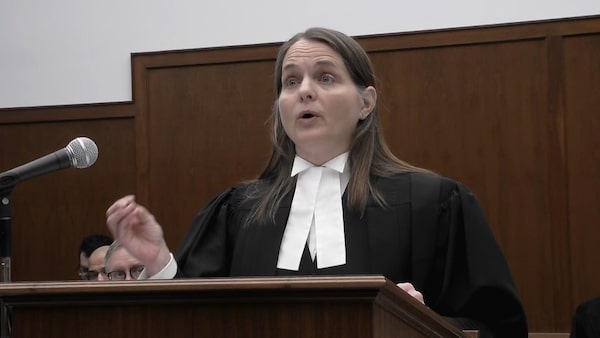
In this image grab, Sharlene Telles-Langdon, a lawyer for the Attorney General of Canada, addresses the Saskatchewan Court of Appeal in Regina, on Feb. 14, 2019.The Canadian Press
Increasing levels of greenhouse gases are a matter of national concern and the provinces are incapable of facing the threat alone, federal government lawyers argued Thursday in defence of Ottawa’s climate-change plan.
On the final day of hearings as Saskatchewan’s Court of Appeal considers whether a federal carbon tax is constitutional, lawyers for the Attorney-General of Canada shifted their defence of Prime Minister Justin Trudeau’s climate plan as they faced a skeptical panel of judges.
A day after lawyers for three provincial attorneys-general argued that the carbon-tax legislation violates Canada’s founding principles and threatens to upend the balance of power in the federation, federal lawyer Sharlene Telles-Langdon said Ottawa and the provinces must work together. She said the federal law looks only to regulate the cumulative impact of greenhouse gases at the wider national level and each province remains free to regulate emissions within their borders.
“We are trying to provide some clarity to alleviate the provinces’ concerns,” she said in a Regina courtroom. According to Ms. Telles-Langdon, the federal law doesn’t single out any one province, which she said could violate the constitution, but instead establishes country-wide standards.
“There’s been a national benchmark set. Provinces can enact their own legislation. It is assessed against that benchmark,” she said. When asked by one of the five judges why Ottawa had used only a “half-measure” and hadn’t set a national carbon price, Ms. Telles-Langdon said that approach would be less respectful of the provinces.
The appeal court has yet to rule on the case, which is expected to eventually end up at the Supreme Court of Canada.
Read more: Federal carbon tax violates Canada’s founding principles, Saskatchewan’s lawyers argue
Opinion: The carbon tax case is a dangerous political game
Saskatchewan has argued that the law is unconstitutional because it isn’t being applied equally across Canada. Lawyers from Ontario and New Brunswick shared similar concerns.
Saskatchewan, Ontario, New Brunswick and Manitoba do not have provincial climate plans that meet Ottawa’s standards and will be subject to a federal tax starting in April. The carbon price starts at $20 a tonne and increases by $10 annually until 2022.
Dwight Newman, a constitutional-law professor at the University of Saskatchewan, said the numerous questions from the judges showed that they were struggling to understand the new federal position, which differed from Ottawa’s earlier stand in legal filings.
“Their lawyer struggled in their argument, and that puts things in an interesting position where Saskatchewan’s argument was stronger than many had expected – and the federal government’s didn’t do as well,” he said.
Ottawa said it has the power to impose the carbon tax under Section 91 of the Constitution, which gives the federal government broad powers to make laws for “peace, order and good government.” Saskatchewan’s lawyers have warned that Ottawa is looking to claim jurisdiction over an area that has historically been under the control of the provinces.
B.C. intervened in the case in favour of the federal legislation and Gareth Morley, a lawyer for the Attorney-General of B.C., said the courts have the power to restrict Ottawa if Parliament pushes too far with climate regulations.
“Properly understood, the matter does not fundamentally alter the balance of the federation,” he said. “The fate of the planet is involved so it’s something the federal government should be given leeway to do.”
According to Mr. Newman, the two sides advanced differing arguments about what the case is about, describing it either as a debate about broad federalism or a more limited look at federal powers. The final decision will hang “on what version the court ends up accepting,” Mr. Morley said.
Alberta opposition leader Jason Kenney promised on Thursday that if elected, his United Conservatives will pass legislation that would require a referendum be held before any future provincial government attempts to introduce a new carbon tax.
The oil-rich province has had legislation since 1995 requiring a province-wide vote to implement a sales tax. The law has never been used. Mr. Kenney said a UCP government would immediately repeal the province’s current carbon tax and amend the Taxpayer Protection Act to include carbon taxes in addition to the limit on sales taxes. A general election needs to be held in Alberta before the end of May.
 Justin Giovannetti
Justin Giovannetti